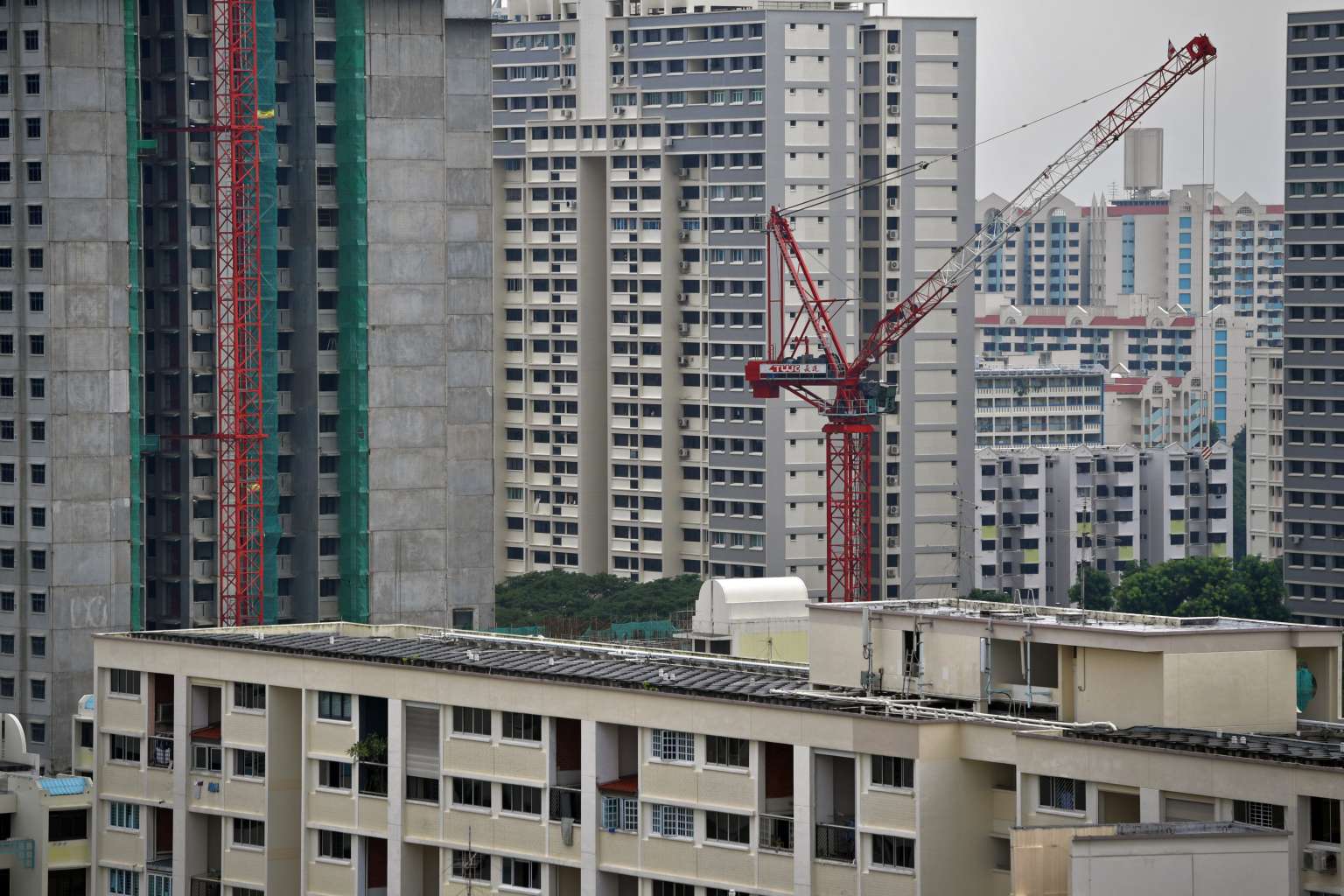Parliament: HDB blocks safer than before, says Lawrence Wong addressing falling HDB parts
Sign up now: Get ST's newsletters delivered to your inbox

Construction works among public housing blocks near Toa Payoh Lorong 7.
ST PHOTO: KUA CHEE SIONG
Yeo Sam Jo
Follow topic:
SINGAPORE - Housing Board blocks are "safer than before", as the HDB continuously improves its designs and uses safe and reliable building methods, National Development Minister Lawrence Wong assured the House on Monday (Nov 7).
He was responding to Workers' Party chief Low Thia Khiang (Aljunied GRC), who had asked about HDB's guidelines in building design and material use.
The safety of HDB blocks had come up in the light of a recent spate of incidents in which block facade parts fell off.
Picking up on Mr Wong's point that HDB is a "good developer" that does its own regular checks on its buildings, Mr Low had asked "whether HDB is also a good designer" that comes up with safe designs and uses durable materials.
"Part of the requirements of being a good developer is to be a good designer too," Mr Wong replied.
"So HDB of course will always try its best. I won't say that we are perfect. Some of these buildings were done many, many years ago.
"But continuously year after year HDB will always look at improving its design, its guidelines, the way it builds and makes sure that it uses quality materials.
"It uses building methods that are reliable and safe. And if you look at the way this has been done progressively over the years, I can say for sure that the methods have improved and the materials are more reliable and our buildings are safer than before."
In the light of the recent falling facade incidents, MPs Christopher de Souza (Holland-Bukit Timah GRC ), Cheng Li Hui (Tampines GRC), Tin Pei Ling (MacPherson) and Tan Wu Meng (Jurong GRC) had asked about current measures in place to ensure the safety of HDB block facades.
Mr Wong said his ministry will review its policies and benchmark them against other high-rise, high-density cities to identify areas for improvement.
The Building and Construction Authority previously told The Straits Times that it is studying the regimes of cities such as Hong Kong and New York and exploring ways to step up building facade safety here.
Currently, building owners are required to appoint a professional engineer to carry out a Periodic Structural Inspection - every 10 years for residential buildings and five years for other buildings.
Such checks cover only structural parts such as beams and columns, and exclude facade elements such as false ceilings, sunshades and cladding boards, which were involved in the recent incidents.
Mr Wong pointed out that for older HDB blocks, this Periodic Structural Inspection is carried out every five years - more frequently than the stipulated 10-year cycle.
When asked by Mr Pritam Singh (Aljunied GRC) what is defined as an "older" HDB block, Mr Wong said age is not the basis in which the HDB looks at older blocks.
"HDB will look at risks and will also look at materials in that particular building, how they were used," Mr Wong explained.
"So if you look at older blocks generally, say, those built in the 80s, 70s, certainly the materials used then not just by HDB, by any developer then, are very different from the materials used today.
"So rather than have a specific year and say everything before that qualifies, everything after that doesn't qualify, we will look at building materials, we will look at the conditions and naturally we will give greater focus on the older blocks, as I think all town councils should within their own risk-based assessment and inspection."
Town councils are responsible for their maintenance of HDB building facades under the Town Councils Act.
In 2004, the HDB implemented a co-payment scheme in which it foots half of the repair cost incurred by town councils to repair external facade finishes of HDB blocks.
Mr Singh asked if the National Development Ministry would consider increasing this co-payment for town councils that have a larger number of older blocks under their care.
Mr Wong said they are "always prepared" to review and update their schemes and upgrading programmes, but added that town councils should do what is necessary first.
"I think first and foremost we would ask all town councils to abide by their requirements and their responsibilities and make sure that adequate provisions are put in place to maintain their estates well," he said.
Over the past two months, a sunshade, two ceilings and a cladding board have dislodged from HDB blocks in four separate episodes.
No one was injured in any of the incidents.
On Sept 25, a concrete sunshade on the fourth storey of Block 201E, Tampines Street 23, fell onto another sunshade on the third storey.
On Oct 9, several ceiling boards fell during lunchtime at a coffee shop at Block 148, Silat Avenue in Bukit Merah.
About a week later, on Oct 17, a false ceiling at the void deck of Block 807, Tampines Avenue 4, collapsed after termites attacked the wooden frame that held it up.
Most recently, a cladding board made from calcium silicate came off Block 51, Circuit Road in MacPherson, and crashed to the ground.
Investigations into the Tampines sunshade and Circuit Road incidents are ongoing.

